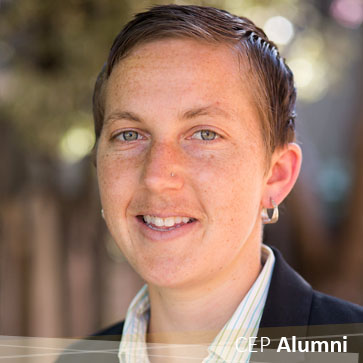Former position at CEP
Senior Research Analyst
Length of tenure at CEP
3 years, 10 months
What are you up to these days?
I am Director of Business Development at a new social venture called Opportunity@Work, currently based at New America in Washington D.C. O@W is focused on “rewiring the labor market” to ensure anyone who can do the job gets the job and that the opportunity to become well-prepared is accessible to all, starting with jobs in information technology (IT). There are more than 600,000 open IT jobs today, and employers can’t fill their open positions fast enough. One of our first projects is to create the infrastructure to support the TechHire Initiative — an effort comprised of 31 communities across the country (so far) to enable more employers to recruit and place IT job applicants based on their skills and to increase access to accelerated training opportunities. Moving forward, we plan to build a portfolio of projects, all contributing to regional labor market ecosystem change — that is changing the way that employers recruit, hire, train, and promote, changing the type of training that is available and how it is financed, and changing the way that job seekers select careers and training pathways.
How did your time at CEP prepare you for what you’re doing now?
Most importantly, I observed first-hand how data and information can drive individual and organizational behavior change. I had the opportunity to work closely with clients to get some understanding of their work, create and present assessments to these clients, and then see how the findings in the reports led to meaningful changes in systems, processes, and individual behavior. I also had the chance to research, develop, and pilot a new assessment tool — the Donor Perception Report (DPR). These experiences shaped my perspective on how to affect positive change in the world. I believe that across sectors — non-profit, public, and private — most organizations are just figuring out how to better use data to inform their strategies, tactics, and internal operations. Since I left CEP, a theme that carries through my work is my focus on how to get more of the right information and data in front of social sector leaders.
I was also shaped by CEP’s strategy research. There are too many organizations in the social sector that I will not work for because the way they describe their efforts does not meet CEP’s bar for being “strategic.” (Hypothesized causal connection between the organization’s activities and the organization’s intended impact, and some type of data to support that hypothesis.)
And finally, I have not been able to shake the lasting effect of having spent four years working at an organization as well-run as CEP. I am currently about five months into a job at a startup nonprofit, and I can’t count the number of times I have referred to a process, system, or practice that we had at CEP. Over the years since CEP, as I’ve learned about how other organizations are run, one example (from many) of a CEP characteristic that differentiates it from many other organizations is the quality of the internal communication and transparency.
What did you do between your time at CEP and your current role?
I spent two years at UC Berkeley’s Goldman School getting an MPP, and while there I helped to design, fundraise for, and launch the Berkeley Food Institute. I also did some primary research, the most interesting example being my contribution to the report Shelved: How wages and working conditions for California’s food retail workers have declined as the industry has thrived.
I then moved to D.C. to work for the Department of Agriculture as a Presidential Management Fellow. I went to USDA with every intention to work on food policy (long a passion of mine), but ended up getting pulled into high-priority economic development initiatives. I became the Department’s lead on the Promise Zone Initiative, and after a year at USDA I was asked to do a detail with the National Economic Council at the White House working on community economic development.
It was at National Economic Council that I got hooked on the work I am doing now. I spent about half my time contributing to the President’s efforts to increase private investment in essential infrastructure. The other half of my time was on workforce, and primarily on what turned into the TechHire Initiative — an effort comprised of 31 communities across the country (so far) to enable more employers to recruit and place IT job applicants based on their skills and to increase access to accelerated training opportunities. Supporting and scaling the models being developed as part of this initiative is the first project of the startup social venture where I am working.
What do you miss most about working at CEP?
The people and the culture.
What advice would you give someone about working at CEP?
Warning: CEP may be the most well run place you will ever work. After CEP, you may find that the only way you can work at a place that lives up to CEP is to take on a leadership role at a startup and make sure that you personally play a role in shaping how the organization is run. Joking (sort of). More seriously, I would say: 1.) Absolutely take the job if they offer it to you; and 2.) above anything else, make sure to get to know the people at CEP. They are its greatest asset, and they will be your greatest asset. Make them your close friends, and be open with them about your hopes and goals, and also let them know about what you are struggling with. They will make sure that you succeed and grow professionally at CEP, but they will also be willing to help you think way beyond CEP. And if you don’t stay at CEP forever (which you should consider if it seems like they might let you), they’ll set you up for success with your next steps.
Describe your perfect Sunday
Sleeping in, then breakfast and good coffee in my sunny backyard with my wonderful fiancé. Then an impromptu walk in the neighborhood with friends. In the afternoon a good tennis game or run, and cooking dinner at home, ideally going to bed early knowing the week will be packed.



